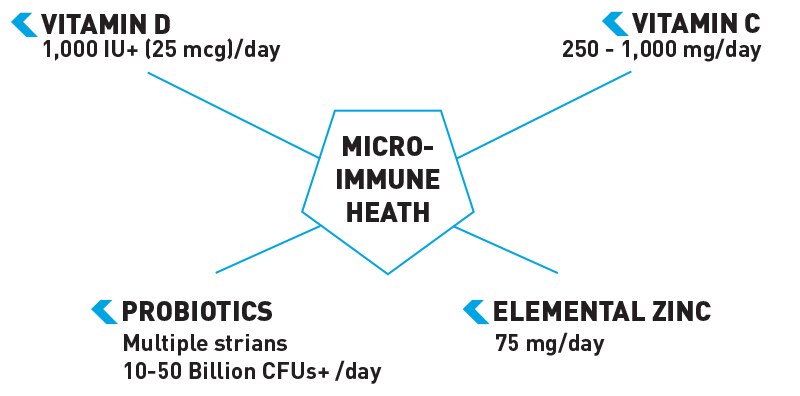Exercise and Nutritional Immunology. A Three-Part Series: Part 2: Micro and Supplemental Immune Health
Created by Karlyn Grimes, MS RD LDN CSSD+
(biography click here)
The first article in this three-part series outlined the current macronutrient guidelines for carbs, proteins, fats and fluids that have been shown to fortify and strengthen the immune system. Part two will take a look at the little guys (aka the micronutrients) who discreetly but impressively support optimal functioning of this intricate system.
KLEAN MICRONUTRIENT IMMUNE HEALTH GUIDELINES
Vitamin D
For quite some time, it has been well-known that ample vitamin D status is essential for maintenance of optimal bone health, but recent research has identified vitamin D as a multitasking superstar directly involved in immune cell function and skeletal muscle growth. Translation for athletes: extra support for the circulatory and respiratory systems so they can consistently work all-out.‡
Unfortunately, suboptimal vitamin D status is widespread among the general population and athletes worldwide. This profound deficiency relates to limited dietary vitamin D sources and the fact that skin exposure to sunlight accounts for 90% of the annual source of vitamin D. Hence, deficiencies are especially common in athletes that primarily exercise indoors or in northern regions of the U.S. and at higher latitudes around the globe, where daylight is limited in the winter. Other factors that can lead to compromised vitamin D status include regular use of sunscreen, darker skin pigmentation, greater body fat levels and aging.‡
![]()
Antioxidants
Antioxidants such as beta carotene, vitamin C and E, and phytochemicals are known for their ability to scavenge free radicals. Intense and/or long duration training accelerates free radical production, which can lead to immune, muscle, brain and other cell damage, and result in subsequent performance decline. A review of multiple studies revealed that heavy exercisers demonstrated support for upper respiratory health when they consumed between 250-1,000 mg of vitamin C daily.‡
![]()
Probiotics and Prebiotics
Another area of interest in the nutritional supplement arena for athletes is probiotics. These live microorganisms, when ingested regularly in appropriate dosages, are thought to confer numerous health benefits, including immune support, by temporarily modifying gut-dwelling bacteria known as the microbiota. Probiotics can support immune health by fortifying the intestinal barrier. As these live microbes metabolize foodstuff, they produce by-products that maintain healthy colon cell function. What’s more, the beneficial effects of probiotics go beyond the gut, and recent research on the effects of these noble warriors on an athlete’s overall immune and gut health is downright promising.‡
![]()
Zinc
It is estimated that up to 90% of endurance athletes do not receive adequate amounts of zinc, which may be due to low-calorie and low-protein diets that are short on meat and high on carbs. Zinc is a known for its antioxidant and immune-supportive properties. Zinc lozenges, containing ~75 mg of elemental zinc, plays a fundamental role in healthy immune function. It must also be noted that zinc is critical for exercise recovery, since it is involved in protein synthesis and repair of tissues.‡
![]()
A Final Word…
Cultivating an immune fortress will allow athletes to maintain good health status in order to complete their training schedule and be optimally prepared for competition. The perfect combination of macronutrients, micronutrients and various nutritional supplements can act as scaffolding for an athlete’s immune fortress. Each athlete should invest some time striving to identify their ideal nutrient cocktail that allows them to work at their peak. The third part of this series will provide other lifestyle suggestions that have been shown to further bolster immune operation.

Bio
Karlyn Grimes, MS RD LDN CSSD, is the founder of Simply Simple Health (SSH) and author of “The Everything Anti-Inflammation Diet Book.” SSH creates and administers nutrition, fitness and health education programs for athletes, educators, coaches and sports teams at schools and colleges throughout the Boston area. Its programming includes individual and group sports nutrition counseling, as well as sport-specific personal training. SSH also contributes to numerous academic textbooks and magazines.
Karlyn has a dual Master’s degree in nutrition and exercise physiology from Boston University and a Bachelor of Arts degree in biology from Colgate University, with a minor in economics. She is a registered dietitian (RD) with the Academy of Nutrition and Dietetics, a certified specialist in Sports Dietetics (CSSD) and a licensed dietitian nutritionist (LDN) in the state of Massachusetts. She is currently a faculty member in the Nutrition and Biology Departments at Simmons College in Boston, where she teaches sports nutrition, medical nutrition therapy, exercise physiology, anatomy and physiology, general biology, and numerous other courses.
+Karlyn Grimes, MS, RD, LDN, CSSD is a retained advisor for Klean Athlete.
Reference
- Palmowski, J., BoBlau, T.K., Ryl, L., Kruger, K., & Reichel, T. (2019). Managing Immune Health in Sports – A Practical Guide for Athletes and Coaches. German Journal of Sports Medicine, 70(10), 219.
‡These statements have not been evaluated by the Food and Drug Administration. This product is not intended to diagnose, treat, cure or prevent any disease.
